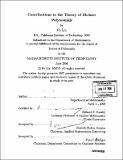Contributions to the theory of Ehrhart polynomials
Author(s)
Liu, Fu, Ph. D. Massachusetts Institute of Technology
DownloadFull printable version (3.866Mb)
Other Contributors
Massachusetts Institute of Technology. Dept. of Mathematics.
Advisor
Richard P. Stanley.
Terms of use
Metadata
Show full item recordAbstract
In this thesis, we study the Ehrhart polynomials of different polytopes. In the 1960's Eugene Ehrhart discovered that for any rational d-polytope P, the number of lattice points, i(P,m), in the mth dilated polytope mP is always a quasi-polynomial of degree d in m, whose period divides the least common multiple of the denominators of the coordinates of the vertices of P. In particular, if P is an integral polytope, i(P, m) is a polynomial. Thus, we call i(P, m) the Ehrhart (quasi-)polynomial of P. In the first part of my thesis, motivated by a conjecture given by De Loera, which gives a simple formula of the Ehrhart polynomial of an integral cyclic polytope, we define a more general family of polytopes, lattice-face polytopes, and show that these polytopes have the same simple form of Ehrhart polynomials. we also give a conjecture which connects our theorem to a well-known fact that the constant term of the Ehrhart polynomial of an integral polytope is 1. In the second part (joint work with Brian Osserman), we use Mochizuki's work in algebraic geometry to obtain identities for the number of lattice points in different polytopes. We also prove that Mochizuki's objects are counted by polynomials in the characteristic of the base field.
Description
Thesis (Ph. D.)--Massachusetts Institute of Technology, Dept. of Mathematics, 2006. Includes bibliographical references (p. 89-91).
Date issued
2006Department
Massachusetts Institute of Technology. Department of MathematicsPublisher
Massachusetts Institute of Technology
Keywords
Mathematics.